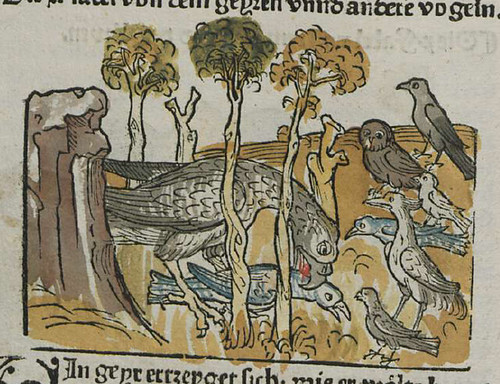HODIE (Roman Calendar): Kalendae Februariae, the Kalends of February.
MYTHS and LEGENDS: The art image for today's legend shows Actaeon Attacked by His Dogs; you can also see the legends for the current week listed together here.

TODAY'S MOTTOES and PROVERBS:
TINY MOTTOES: Today's tiny motto is: Iustitia omnibus (English: With justice for all).
3-WORD PROVERBS: Today's 3-word verb-less proverb is Rerum Sapientia custos (English: Wisdom is the guardian of all things).
AUDIO PROVERBS: Today's audio Latin proverb is Hectora quis nosset, si felix Troia fuisset? (English: Who would know Hector, if Troy had been happy?). To read a brief essay about this proverb and to listen to the audio, visit the Latin Via Proverbs blog.
PUBLILIUS SYRUS: Today's proverb from Publilius Syrus is: Heu, quam multa paenitenda incurrunt vivendo diu (English: Oh, how many things you come to regret by living a long time).
ERASMUS' ANIMALS: Today's animal proverb from Erasmus is Gallus in suo sterquilinio plurimum potest (English: The rooster can do much as he pleases on his own dungheap; from Adagia 4.4.25).
BREVISSIMA: The distich poster for today is Prudentia. Click here for a full-sized view.

And here are today's proverbial LOLcats:


TODAY'S FABLES:
MILLE FABULAE: The fable from the Mille Fabulae et Una widget is Adolescens Piger, a debate between hard work and laziness.
FABULAE FACILES: The fable from the Fabulae Faciles widget is Vultur Convivium Faciens, the story of the vulture's birthday party (this fable has a vocabulary list).
Greek Bible Art - and Latin and English, too. Below is one of my Greek Bible Art graphics; for the individual Greek, Latin and English versions of the graphic, see the blog post: εὖρον αὐτὸν ἐν μέσῳ τῶν διδασκάλων. Invenerunt illum in medio doctorum. They found him in the midst of the doctors.

